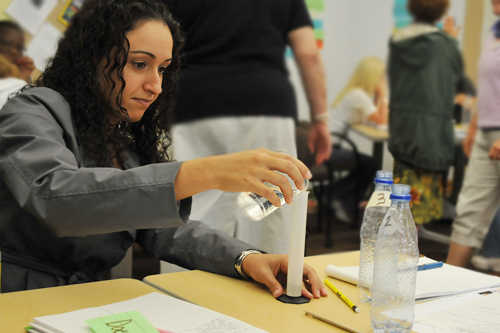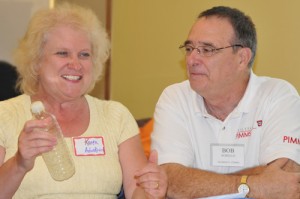Local Teachers Learn Hands-On Methods to Teach Sciences from PIMMS

Dozens of Connecticut teachers went back to school July 7 to gain knowledge, confidence and skills for teaching their students about science, energy and energy conservation.
As part of the 2009 Energy Education Workshops series, sponsored by the Project to Increase Mastery of Math and Sciences (PIMMS) and eeSmarts, teachers learned creative exercises to bring back to their classrooms. The annual program is open to all teachers in the state.
During a “bottle shake” energy transformation experiment, the teachers were put into groups of four and given two plastic water bottles with a small amount of clear liquid in each bottle.
“What will happen if you shake a bottle of liquid for eight minutes,” asks Marilyn Odell, a PIMMS consultant. “I want you to generate an investigation and form a list of questions.”
Teachers in “group 2” brainstormed some possible answers.
“Will the liquid get slightly warmer from body heat transfer?”
“Will the design of the bottle affect the temperature?”
“Does the size and shape of the bottle impact temperature?”
“Does the method of how the liquid is shaken affect the temperature? What if you swirl the liquid instead of shake it?”

The members of group measured the temperature of two bottles. One volunteer shook a bottle without applying heat, whereas the other volunteer clasped her hands around the bottle. After 8 minutes of shaking and a temperature reading, the group made a conclusion.
“When we applied heat to the bottle, it did go up from 26 to 27 degrees,” says Lisa Montelli, a fourth grade teacher at Simpson-Waverly Classical magnet School in Hartford, Conn.
Montelli says she signed up for the PIMMS program to learn similar hands-on activities to teach to her own students.
“These apply not only to science but to other disciplines too,” she says. “The kids are going to enjoy these lessons. When they’re hands-on, they are completely engaged.”
Other workshop topics for grades K-5 include energy transformation; reduce, reuse and recycle; an ice cube activity; weather watch; house building materials; insulation fashion show; measuring solar angles; series and parallel circuits and building a circuit board and electromagnetism.
Workshop topics for grades 6-9 include energy transformation in food, fuel and fire; Energy Star calculation and payback time; consumer investigation; measuring electrical usage; clean and renewable resources; and the environment.
In addition, advanced workshops were held on ice and water, motors and generators, tracking the sun, dissecting appliances, the power of water and building mouse trap cars and solar racers.
All workshops taught during the program are backed by the Connecticut State Department of Education’s Core Curriculum Frameworks in Science. The Framework defines key science concepts and skills, as well as standards and expected performances for inquiry and for science and technology in society.
“I really enjoy participating in these workshops with other teachers, so we can all become rejuvenated on current philosophies in science,” says Karen Aduskevich, a fourth-grade teacher from Thalberg Elementary School in Southington, Conn.
eeSmarts Summer Professional Development Workshops are funded by the Connecticut Energy Efficiency Fund and offered to state teachers at no charge. Stipends are paid to participating teachers.
The workshops are co-sponsored by Connecticut Light & Power, the Connecticut Energy Efficiency Fund and The United Illuminating Company. Connecticut’s Energy Efficiency Programs are funded by a Charge on Customer energy bills.

